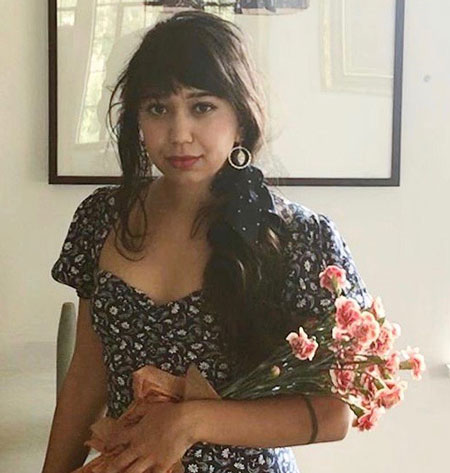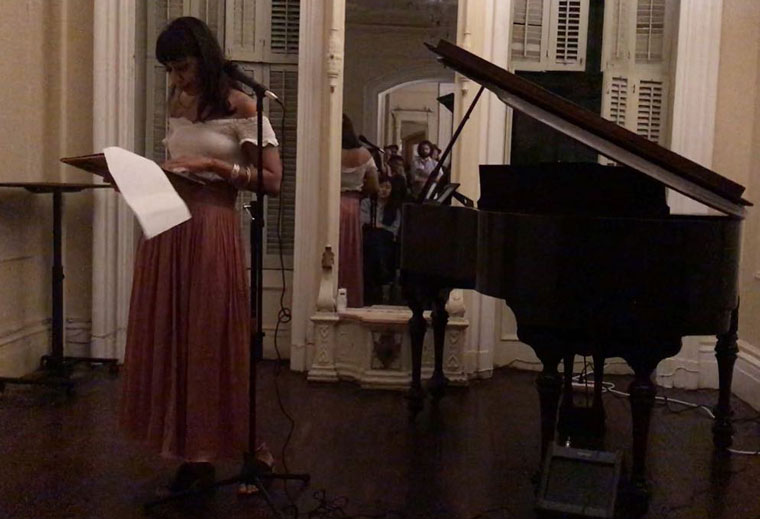Alumni Spotlight: Jai Hamid Bashir

Since graduating from EH, you have been widely published and recognized for your poetry. How does it feel to have your craft recognized? What are you most proud of?
Being published is a blessing. Anyone being willing to encounter and house your work is a blessing. I say “blessing” because I believe all of us, somewhere, internally, are creators of small, daily poetry. Those of us who self-identify as poets are the individuals in our species who are just the most dedicated to the lineage and elongation of the craft because it is compulsory to our being. Getting published means that your devotion, your exercising of ideas, sound, theory, craft, and abilities might be read beyond you. It is a gift. I’m very proud of my poem that is coming out in POETRY Magazine this September; it is a poem I composed for my Nani and Ma. I am the most proud of finding a voice that feels textrually sonorous and akin to what poetry feels like inside my head.
What major questions, topics, or issues do you explore with your poetry? Who are your influences?
I think I am primarily the most interested in questions about belonging. Whose lineage do we belong to? Whose nation-state? Whose land? Can we belong to someone in an intimate way? What language is ours? Whose body is this? Can this body be mine? How long will I belong here? Could I belong somewhere else? Many of my poems are interested in memory, sensuality, and knowledge of the more-than-human as a medium by which to think about loss. Most of my poems exist in the viscous ecotone between loss and belonging.
I read “Meditation at Lagunitas” by Robert Hass daily; I think it changes me daily. Sylvia Plath remains one of my life’s greatest influences. In addition poets such as Mei-Mei Berssenbrugge, Anna Akmatova, Jorie Graham, Paul Celan, Marina Tsvetaeva, Cecilia Vicuna, Anne Carson, Charles Wright, Frank Stanford, Lucie Brock-Borido, Jim Harrison, Marie Howe, etc. Writers like Terry Tempest Wiliams, Cormac McCarthy, Clarice Lispector, and Ottessa Moshfegh have also had a major influence on how I think about the possibilities of observation. Friends I create alongside, such as Basie Allen, Ana Hardy, and Patrick Bayly are also great inspirations.
How did EH inform your current path as a poet and educator? Any courses or people stand out?
Dr. Brett Clark has been my life’s greatest inspiration to pursue teaching as a vocation and my devotion to writing. Brett has inspired in me a lifetime of hope and courage to speak openly and ardently about climate justice, specifically from the lens of human rights. Further, Brett taught humility, generosity, practices of altruism and listening, strength, and leadership through being a profound example. I wouldn’t be where I am or who I am without having the unique miracle of meeting Brett Clark on one of his first days of teaching at the University of Utah.
I also feel such a deep gratitude to Stephen Tatum and Katharine Coles, who I took courses from in my time in the program. Courage is what I found in this program. Courage to fail, edit, and try again and be met with compassion and mentorship. A remarkable gift for a young artist.
I think I wrote the first poem I truly felt connected to during one of our trips to Centennial Valley, Montana. It was a cold, cosmic morning. I woke up to friends gathered around to witness a moose and her calf out the cabin window. There, in the distance, in tides of grass, there she was. Many of the ideas I now carry in my writing first originated or alchemized by having the time to wonder and be stunned by the beauty and terror that are awakened when studying the humanities from an environmental lens.
What advice do you have for current EH students?
Journal. Keep notes. Learn from your journals and your notes and carry them with you wherever this wild desire to remedy the world takes you. Cultivate hope. Find time for solace. Find time for sacred rage. Practice what is important. Embrace imperfection and do the work that is necessary. Your thesis can and will evolve!
Oh, in addition, be extra nice to Cory. Cory rocks!
 Jai giving a reading at the Langston Hughes House in Harlem.
Jai giving a reading at the Langston Hughes House in Harlem.
